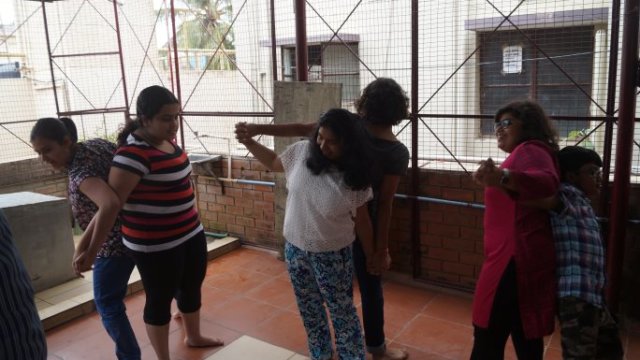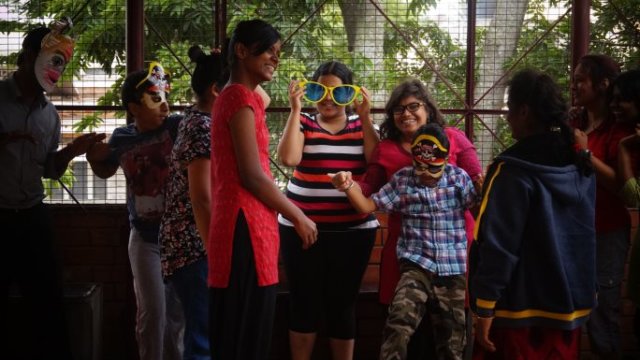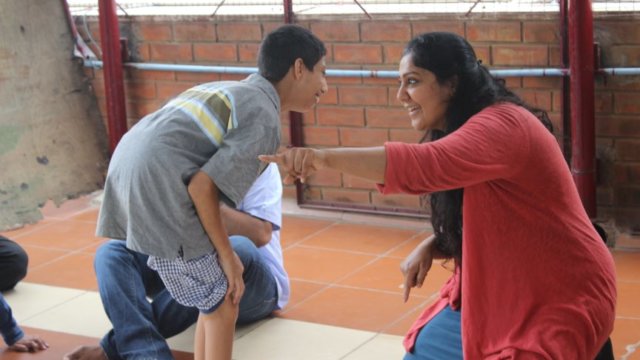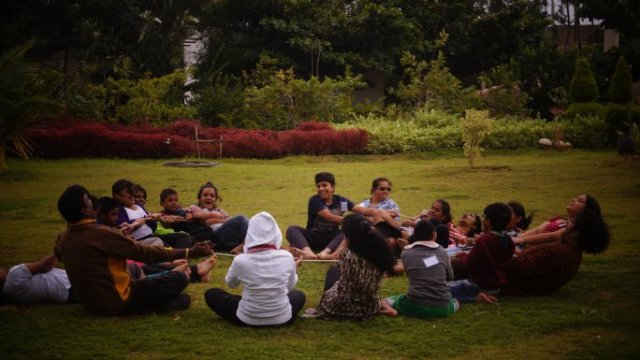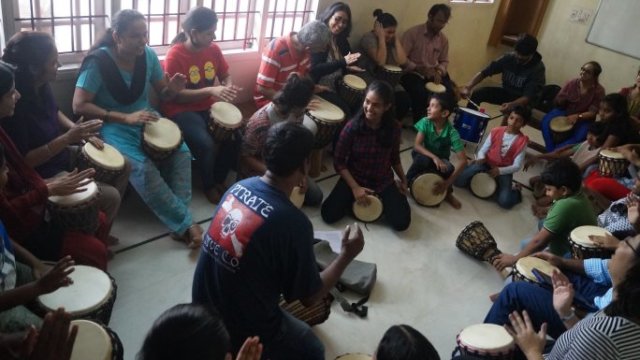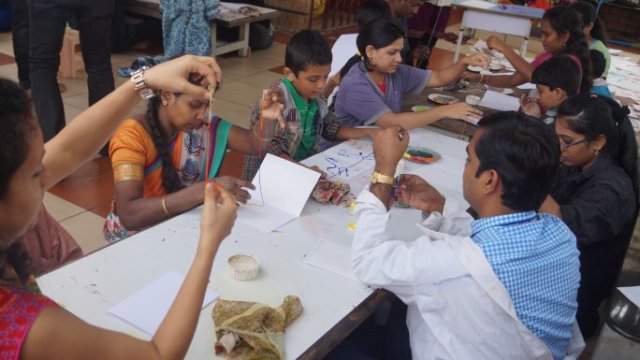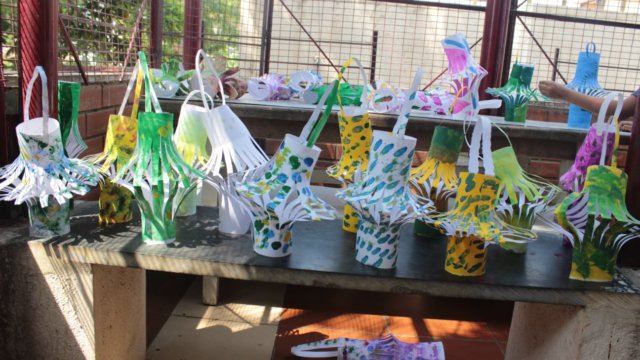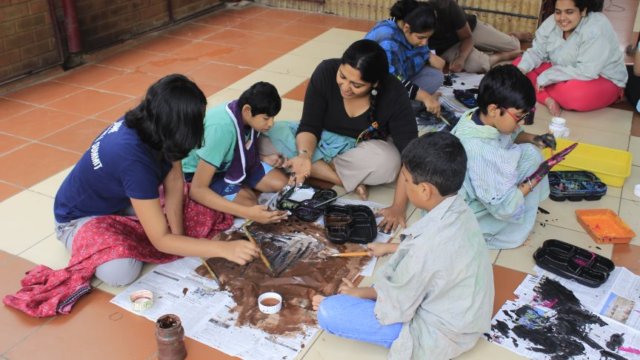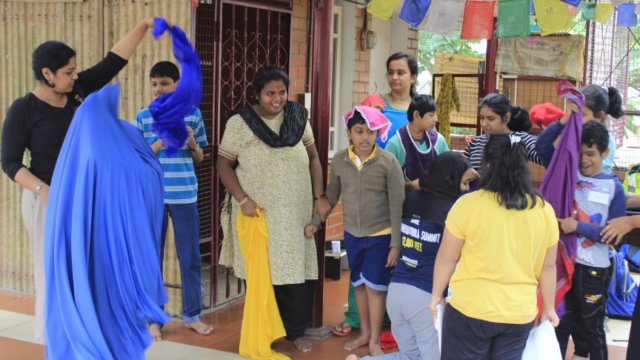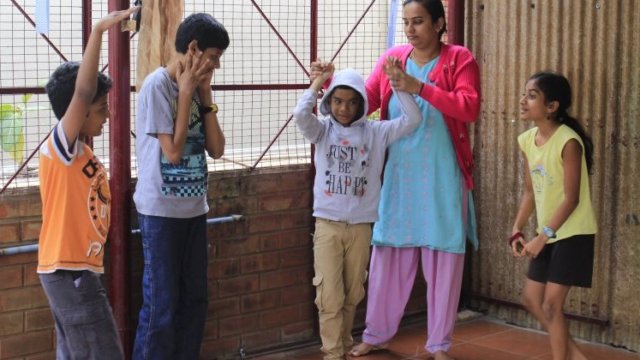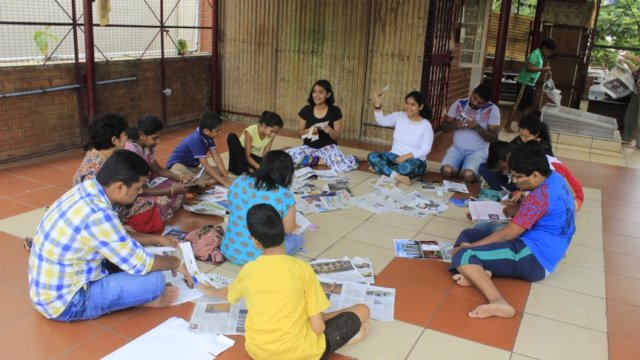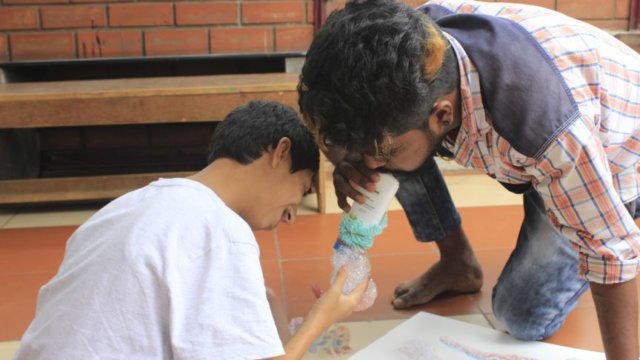Pipilika
Pipilika is aligned with our core essence of using arts practices to work towards inclusion. Theatre, games, improvisation, drumming, movement and other rich experiences in the arts are offered to children from diverse backgrounds all together.
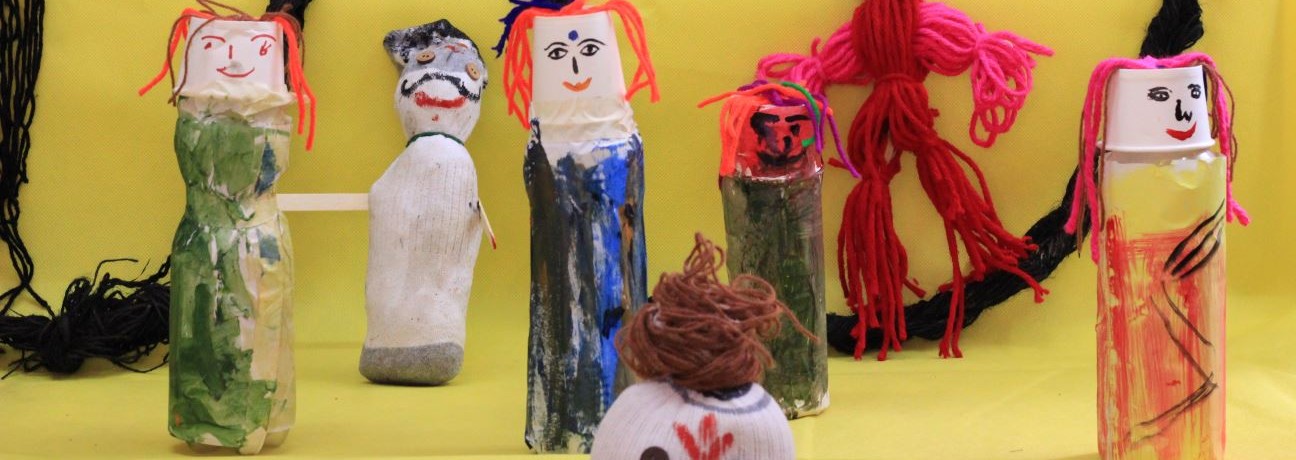

“If a child is to keep alive her inborn sense of wonder, she needs the companionship of at least one adult who can share it, rediscovering with her the joy, excitement and mystery of the world we live in.”
– Rachel Carson
Pipilika – Inclusive Connections
Snehadhara believes that healing and learning is as much a process of the community as it is a personal journey. Each child requires meaningful and holistic learning spaces which are co-created by all those who engage with the child. Pipilika, which means ‘ants’ in Sanskrit, is our outreach programme that anchors our belief in the use of the arts towards practicing and building inclusion. Arts based interventions are taken to schools and learning centres with the objective of working with very diverse groups of children. Pipilika focuses on capacity building, equipping all those working with children and adults with special needs to look at inclusive and integrated methods of learning and teaching. Pipilika has explored a multitude of art forms over the years: storytelling, drumming, structured play, weaving, quilting, dyeing, origami and craft, cooking, pottery, body jamming and theatre. This mix of various art forms has not only brought a lot of fun and frolic, it has also gently helped us to look inwards.
The Program over the years

A Place Where I Belong…
That’s what each of us needs. A place where, without question, we are wanted, welcomed and have a right to be. A sense of belonging makes us feel whole and complete. It engenders self-esteem and self-confidence. Belonging makes us feel safe and allows us to be who we are and to be proud of who we are. Belonging means we are accepted, which leads to the conclusion that we are OK. To belong is to feel loved. Feeling loved, we are free to learn, to grow, to give and to, in turn, love others.
-Tim Knoster
True to its name, this year the programme has been steadily marching towards giving an experience of joyful arts-based learning to marginalized children. The facilitators from the Centre worked mostly at Snehasadan (Boys Home) and Desire Society (A home for HIV Positive children). In the previous year, our Pipilika programme brought in learnings about the need for consistent engagement, a need to plan the sessions in ways that more children participate and reaffirmed the power of arts practices in facilitating inclusion. The high energy in the spaces that the Pipilika team worked in, also brought insights about the usefulness of games that draw participants towards introspection and reflection.
The programme also travelled to the Government Girls Home in Bangalore from March 2019 to February 2020. Weekly sessions were held at the premises which incorporated various arts-based practices like drumming, stories, drama, play, visual arts, movement, dance and so forth. This project aimed to use ABT to assist in improving the psychosocial wellbeing of the girls. ABT has proven to be effective in creating a safe and creative space for students to express their thoughts and feelings openly and freely.
‘Pipilika 2018-2019 – Building Communities’ wished to be the driving force and reach out to communities to initiate, establish, maintain and nurture relationships with spaces that align with us on inclusion as the way forward. We changed the format of Pipilika from the last four editions. We moved from working with children and groups in our premises, to discovering spaces that invited us to explore the richness of their environment.
Through Pipilika, we travelled with our pitara of artistic media, beating our drums, singing our songs, waving the vivid flag of diversity and celebrating inclusion. The team, consisting of facilitators and interns, travelled to Shivabala Yogi Ashram, Ragi Gudda Basti, Sunbeam Child Fund Association, Government Girls’ Home and Desire Society.
Once a week we also facilitated sessions through a six-month programme at the Government Girls Home in Bangalore, with the intent to focus on their self expression and social goals.
Pipilika 2017-2018 offered a treasury of activities with varied facilitators. This year has been special as senior Pipilika children facilitated sessions for their peers. We moved from two sessions per month to three. The focus was on the interplay of senses, collective imaginings and verbal and non verbal expression. We co-facilitated with Team Vibhinna in the first term with other external facilitators and the Snehadhara Team taking over for subsequent terms. To carry independence and social skills into welcoming outdoor spaces, the children were included in the Classroom without Walls program. This involved visits to the delectable Cake Festival and the delightful Play Conference apart from others.
Our effort towards social inclusion was characterised by bringing children together from different schools and learning centres and introducing them to varied artistic experiences. There were two spaces that opened up to the participants for the Pipilika sessions this year. Some sessions were at the JP Nagar centre and others at Gunina Farms. Each space gave its unique flavour to the program and introduced greater challenges therein. While pottery, drumming and visual arts marked the sessions at the centre, the focus was on storytelling and exploration at the farm. External and in-house facilitators complemented the program with their artistic contributions and provided the children with a gamut of explorations right from messy clay to myriad colours, rhythm and beats, creative machinations to all facets of play.
The focus for us this year across our Pipilika program had been to explore the methodology of working with the arts in manifold ways in diverse spaces. The program had three main parts, the overnight experience, the sessions at the centre and the outdoor visits. The overnighters at the centre were designed to allow each child to exhibit independence in taking care of their belongings, self care needs of eating and dressing, setting up their bedding, packing/unpacking etc. The sessions at the centre were focused on Visual Arts, Storytelling , Movement for Body Awareness, Outdoor Visits.
A very significant experience for the children was the exposure to theatre techniques at the centre and then the presentation of the play at Ranga Shankara. The intent was to see how they receive the practices on a regular basis, how they respond to the rigor of a production and how they carry themselves in a social setting.
The sessions this year have involved group sharing, creative writing, laban movement, play and weaving. The children of this program have explored working with clay, cooking, theatre, origami, wall painting and a game of cricket so far. These children have also been a part of the overnighters once every six weeks. As part of the Pipilika’s Outreach, our ‘Art in Education’ program focussed on taking ABT to other schools and children. This aimed at introducing creative interventions into classroom settings.
This year we covered a wide array of art forms in five slots of six sessions each. The sessions involved exploring impromptu costume parties to one-minute skits, traditional board games, some introspective story sharing sessions with theatre and storytelling, creation of myriad paintings and shadows to create puppets, pottery, baking, folk dances from across the globe and creation of foot tapping rhythms during sessions on music and drumming. Special sessions on rubik’s cube, masks, mirrors, film-screenings were also conducted by experts.

